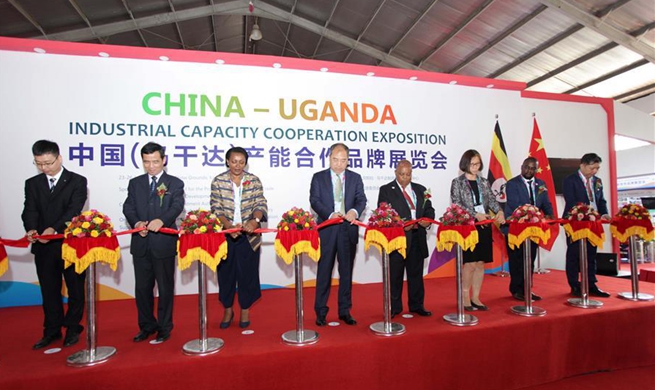FUZHOU, July 24 (Xinhua) -- For foodies visiting the coastal city of Xiamen, Tusundong, or sandworm jelly, is a must-try local delicacy, though many may freak out when they see tangled worms inside the ball-shaped jelly.
The worms, collected from tidal flats, are full of gelatin, which melts in boiling water and becomes jelly after cooling down.
With some soy sauce, chopped garlic, chili, pickled radish slices and sometimes wasabi, the worm jelly offers a texture explosion, which is considered incredibly delicious for those who love it wholeheartedly.
This year, fans of this street food are blessed with more quality jellies, as Chen Weixu, 30, owner of a popular family business that produces and retails the delicacy in the city, upgraded his workshop a few months ago at the cost of 500,000 yuan (72,702 U.S. dollars), part of which was saved because of tax and fee reductions.
Chen said the newly-introduced tax cuts were expected to save him about 200,000 yuan this year, while net profits of the enterprise stood at 500,000 yuan in 2018.
"The new tax policy strengthened our confidence in business expansion," said Chen, adding that the number of workers in his company has increased from four or five a year ago to 20 now.
Chen's company was among the many small and micro firms that have benefited from the new batch of tax-cutting measures, which include substantial drops in business income tax rates and a considerable increase in the tax threshold.
Chen's business falls into the category of small firms which have seen their tax rate fall from 25 to 5 percent.
The tax breaks for small and micro firms were followed by larger-scale tax reductions to bring down the burden on the real economy as external uncertainties abound and domestic downward pressure has grown.
Chen Fang, CEO of Xiangyu Group, a state-owned enterprise mainly engaged in supply chain management and trading, estimated that the new tax policies could save his company up to 100 million yuan thanks to the lower value-added tax rate, plus 10 million yuan from the lower social insurance payment.
"The number of tax reductions, which is based on a rough static estimate, can be much larger since we will keep growing in 2019," said Chen. "We can invest the money in business expansion and R&D so as to generate more profits."
Ranking among Fortune Global 500, the Xiamen-headquartered enterprise yielded 240 billion yuan in 2018.
Special individual income tax deductions, which took effect on Jan. 1 2019, are expected to save its 10,000 employees over 30 million yuan, according to Chen, adding that the money can help support domestic consumption growth.
"Dividends from the tax reform have benefited enterprises, enhanced their vitality and improved business sentiment," said Deng Ziji, an economist with Xiamen University.
In the first half of 2019, tax revenue rose by just 0.9 percent, down from a 14.4 percent increase in the same period last year, as the government rolled out a slew of measures aiming to slash taxes and fees by almost 2 trillion yuan this year, on top of the 1.3 trillion yuan of reductions in 2018.
The tax reform, which is widely applauded by multinationals operating in China, is among China's efforts to build a market-oriented, law-based and international business environment.
Kern-Liebers Taicang Co., Ltd., a German-invested auto parts producer in Taicang, eastern China's Jiangsu Province, is poised to build a new manufacturing facility with an investment of 300 million U.S. dollars.
"The 3 percent cut in value-added tax helps improve our cash flow, which is very important for small and medium-sized enterprises," said Richard Zhang, CEO of the company.
Zhang, who has been working for the German firm since 1995, said China's business environment was ever-improving, and none of the 318 German-invested enterprises clustered in the city was leaving China.
Statistics show that newly-introduced tax and fee cuts have increased markedly in the first five months of this year, amounting to a total of 893 billion yuan.

















